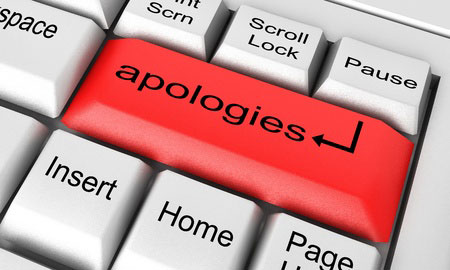The Age of Apology: Why It’s Hurting Us

April 11, 2017
We live in a culture that is filled with a need for political correctness and Internet outrage. Whether it be a comedian making a joke, a celebrity tweet, or even an animated children’s movie, people just love to be upset at things these days to the point where we stop focusing on the real issues at hand.
A recent case of Internet outrage is over Dave Chappelle’s newest comedy specials on Netflix. People are angry because Chappelle talks about Caitlyn Jenner and how accepting everyone was of her transition from male to female. Chappelle says, “I was like, How the [expletive] are transgender people beating black people in the discrimination Olympics? If the police shot half as many transgenders as they did [black people] last year, there’d be a [expletive] war in L.A.”
This, along with jokes about the LGBTQ community, has sparked outrage, with people accusing Chappelle of being homophobic and transphobic.
Maybe it’s just me, but when I’m watching comedy, I tend to leave politics out of it; it just makes it more enjoyable for me. And I think a lot of comedians write their shows assuming we will all do the same. Chappelle has always been the kind of comedian who pushes limits, and I people need to realize that before jumping to judge. In the same special he says that he supports everyone, even the LGBTQ community. Do I think some of the jokes he made might have gone too far? Yes. But I also realize he was doing it to get a reaction because that’s how his comedy works.
Then there is the kind of outrage that shuts down the First Amendment right to freedom of speech. A recent example is the controversy surrounding Milo Yiannopoulos, whose views on certain subjects are incredibly conservative and controversial. For example, he proposes that a relationship between a 13 year old and a 21 year old be decriminalized. Because of this, people are constantly outraged over whatever new thing he has said.
When Yiannopoulos announced that he was going to release his third book with Simon and Schuster, the Internet blew up with people demanding that the book not be released. On Feb. 20, Simon and Schuster announced that it was indeed cancelling the release of his book.
Then came the protests at several college campuses where Yiannopoulos was set to speak. At both UC Davis and UC Berkeley, several of Yiannopoulos’ scheduled talks were cancelled due to protest. So not only did they revoke his right to publish his book, but they also prevented him from sharing his views with others, all because of his views.
This is a violation of the rights the First Amendment grants to all of us, and one doesn’t have to agree with Yiannopoulos — I know I don’t — to see that this is wrong.
How are we supposed to develop a more understanding culture if we are not willing to hear and consider views different from our own? How is anything going to be achieved if we have to watch every little thing we say for fear that someone might read it the wrong way or overthink it? By enforcing this culture of extreme political correctness and social outrage, we are dividing ourselves more than we already are.
In the words of late night host Bill Maher, “Democrats have gone from the party that protects people to the party that protects feelings. From ‘ask not what your country can do for you’ to ‘you owe me an apology’. Republicans apologize for nothing, Democrats for everything. Can’t we find a balance?”
Instead of focusing on serious issues like how Donald Trump is taking giant steps backward on the fight against climate change, we focus on Cracker Barrel and how they fired a man’s wife. Yes, this is a thing: A man tweeted about how his wife was fired after 11 years of service, so now people are harassing Cracker Barrel into giving the man an explanation. You know, this is instead of focusing on the fact that millions of people could soon lose their health insurance.
Instead of policing the Internet, shutting down views that don’t agree with our own and forcing celebrities to apologize for things that aren’t that big a deal, maybe we should focus on the bigger issues facing the world. Once we fix those problems, we can get back to the policing and apologizing.

